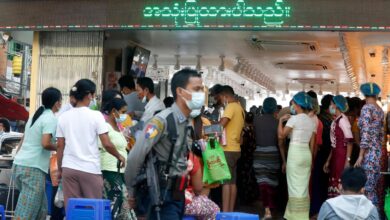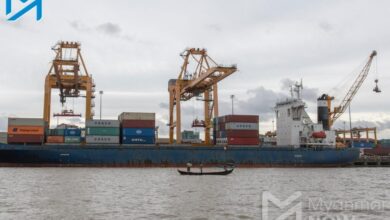
Updated:
A new programme funded by the European Union (EU) to stimulate clothing production in Myanmar has met with criticism from workers’ rights advocates, who say it will legitimise the military regime without benefiting workers.
The European Chamber of Commerce (Myanmar) and the German-based Seaqua Group plan to carry out the project—dubbed the Multi-Stakeholder Alliance for Decent Employment in the Myanmar apparel industry, or “MADE in Myanmar”—according to a four-year implementation plan, funded by €3m from the EU and additional contributions from various clothing brands.
Khaing Zar Aung, president of the Industrial Workers’ Federation of Myanmar (IWFM), said the project not only confers legitimacy on the military council within the International Labour Organization (ILO), but also helps to conceal labour rights violations.
“This project is just for show. It is like saying to the international community that the plight of our workers is not real. They are all trying to pretend that they have better solutions, and that all problems are solved,” she said.
The project only serves the interests of the fashion brands manufacturing clothing in Myanmar and will not be beneficial for workers, she added.
The SMART project, an earlier programme launched in 2013 to support small and medium-sized enterprises (SMEs) in the garment industry, was also funded by the EU. Its ostensible goal was to support at least 200 factories in Myanmar by providing technology, advice, and procedures for the redress of workplace grievances.
Like MADE in Myanmar, SMART—which stands for SMEs for Environmental Accountability, Responsibility and Transparency—was also based on a partnership between the EU and multinational clothing firms that had outsourced their manufacturing to Myanmar.
Myanmar’s trade unions and labour organisations have faced oppression since the 2021 military coup, according to Khaing Zar Aung, and it has become impossible to appeal to the labour office—now under junta control—for support in resolving workers’ rights disputes.
According to Khaing Zar Aung, workers are at a disadvantage even when they have the chance to negotiate with their employers, as employers can manipulate the process to suit their interests. In the factories and workshops that participated in the SMART project in particular, she said, employers had the power to handpick the workers serving on dispute settlement committees.
In a statement published last September, the international workers’ rights organisation Ethical Trading Initiative (ETI) highlighted the exploitation in Myanmar’s garment factories since the 2021 coup, noting that workers were forced to accept low wages, long hours, and unpaid overtime. Workers had also lost their right to freedom of association, the statement noted.
“Brands will find it nearly impossible to conduct normal human rights due diligence, let alone the enhanced due diligence that the present situation in Myanmar demands,” the ETI statement said.
In a statement released last week, the Confederation of Trade Unions, Myanmar (CTUM)—an alliance of 18 labour organisations—said it would not collaborate with the MADE in Myanmar project, deploring its implementation at a time when a multitude of workplace violations were still unresolved.
According to the CTUM’s announcement, the programme will not be capable of protecting labour rights in Myanmar, and will only abet the military council by endorsing its report to the ILO.
Myo Myo Aye, head of the Solidarity Trade Union of Myanmar (STUM) also opposed the project’s implementation, calling it an act of “showing the monkey to beg for rice”—a common Burmese expression that means profiting from an exploitative appeal to pity.
“Frankly speaking, this is ‘support’ for the businesses on the flimsy pretext of benefitting the workers. We object to this because we feel that they are using Myanmar workers as the proverbial monkeys to beg for rice,” she said.
According to a statement issued by STUM on Sunday, the new programme prioritises those factories that participated in the earlier SMART project, and will therefore not apply to the entire labour force.
International clothing companies began to shut down operations in Myanmar after the 2021 coup, responding to domestic and international rights advocates’ concerns that they would be unable to uphold acceptable labour standards under the military regime.
The companies C&A, Tesco PLC, Marks & Spencers, Primark, and Uniqlo announced that they would leave Myanmar.
However, other multinational companies hoping to take advantage of the cheap labour have sought to continue their operations in Myanmar, Myo Myo Aye said.
“Negotiations are underway at the factories where the brands outsource their production. Frankly speaking, this is good for marketing to international consumers. They will publicise what actions they are taking in this country,” she said, referring to the companies’ participation in the project.
Responding to concerns about the current situation of garment workers in Myanmar, Ranieri Sabatucci, the EU ambassador to the country, said he believed the MADE in Myanmar project could actually help to address some of the issues raised.
“We acknowledge that the conditions for workers have deteriorated and the trend is not going in the right direction. However, we believe that we have the opportunity and the responsibility to try and support working conditions for workers and possibly to improve them,” he told Myanmar Now on Thursday.
“Doing nothing would result in massive unemployment and increased exploitation,” he added.
Following the pandemic and coup, the garment sector’s profits have suffered in Myanmar. Orders have decreased, and frequent power outages have necessitated the use of diesel generators to operate sewing machines, driving up production costs.
Under stable conditions, the garment industry has been profitable and generated a high number of employment opportunities in Myanmar. However, due to the closure of factories and general disruption of business, these opportunities have diminished since the military coup.
Correction: An earlier version of this article erroneously claimed that Myanmar Now had reached out to EU representatives for comment.



